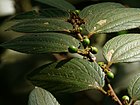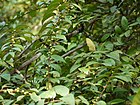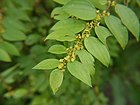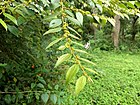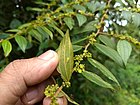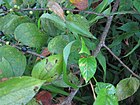Note: This is a project under development. The articles on this wiki are just being initiated and broadly incomplete. You can Help creating new pages.
Difference between revisions of "Ziziphus oenopolia"
(→Chemical Composition) |
|||
| Line 8: | Line 8: | ||
==Chemical Composition== | ==Chemical Composition== | ||
| − | It contains betulin, betulinic aldehyde, betulinic acid, alphitolic acid, euscaphic acid, zizyberenalic acid, and β−sitosterol, one coumarin, scopoletin and four flavonoids, kaempferol, afzelin, quercitrin etc.<ref | + | It contains betulin, betulinic aldehyde, betulinic acid, alphitolic acid, euscaphic acid, zizyberenalic acid, and β−sitosterol, one coumarin, scopoletin and four flavonoids, kaempferol, afzelin, quercitrin etc.<ref name="chemical composition"/> |
==Common names== | ==Common names== | ||
Revision as of 17:21, 18 May 2021
Ziziphus oenopolia is a thorny, evergreen shrub with straggling branches, often scrambling into other vegetation; it can grow around 5 metres tall. The plant is harvested from the wild for local use as a food, medicine and source of materials. The fruits are sometims sold in local markets. The plant is sometimes grown as a hedge.
Contents
- 1 Uses
- 2 Parts Used
- 3 Chemical Composition
- 4 Common names
- 5 Properties
- 6 Habit
- 7 Identification
- 8 List of Ayurvedic medicine in which the herb is used
- 9 Where to get the saplings
- 10 Mode of Propagation
- 11 How to plant/cultivate
- 12 Commonly seen growing in areas
- 13 Photo Gallery
- 14 References
- 15 External Links
Uses
Cuts, Wounds, Indigestion, Stomachache.[1]
Parts Used
Chemical Composition
It contains betulin, betulinic aldehyde, betulinic acid, alphitolic acid, euscaphic acid, zizyberenalic acid, and β−sitosterol, one coumarin, scopoletin and four flavonoids, kaempferol, afzelin, quercitrin etc.[2]
Common names
| Language | Common name |
|---|---|
| Kannada | Pargi, Barige |
| Hindi | Makkay, Makai |
| Malayalam | Tutali |
| Tamil | Suraimullu |
| Telugu | Paraki |
| Marathi | Burgi |
| Gujarathi | |
| Punjabi | |
| Kashmiri | |
| Sanskrit | Karkandhauh |
| English | Jackal Jujube, Small-Fruited Jujube |
Cite error: Invalid <ref> tag;
invalid names, e.g. too many
Properties
Reference: Dravya - Substance, Rasa - Taste, Guna - Qualities, Veerya - Potency, Vipaka - Post-digesion effect, Karma - Pharmacological activity, Prabhava - Therepeutics.
Dravya
Rasa
Guna
Veerya
Vipaka
Karma
Prabhava
Habit
Identification
Leaf
| Kind | Shape | Feature |
|---|---|---|
Flower
| Type | Size | Color and composition | Stamen | More information |
|---|---|---|---|---|
| {{{5}}} |
Fruit
| Type | Size | Mass | Appearance | Seeds | More information |
|---|---|---|---|---|---|
Other features
List of Ayurvedic medicine in which the herb is used
Where to get the saplings
Mode of Propagation
How to plant/cultivate
Commonly seen growing in areas
Margins of subtropical forests, Thickets.
Photo Gallery
References
- ↑ Indian Medicinal Plants by C.P.Khare
- ↑ Chemical constituents
- ↑ [Morphology]
- ↑ Cultivation
Cite error: <ref> tag with name "Common names" defined in <references> is not used in prior text.
External Links
- Pages with reference errors
- Ayurvedic Herbs known to be helpful to treat Cuts
- Ayurvedic Herbs known to be helpful to treat Wounds
- Ayurvedic Herbs known to be helpful to treat Indigestion
- Ayurvedic Herbs known to be helpful to treat Stomachache
- Herbs with Root used in medicine
- Herbs with Bark used in medicine
- Herbs with Fruits used in medicine
- Herbs with common name in Kannada
- Herbs with common name in Hindi
- Herbs with common name in Malayalam
- Herbs with common name in Tamil
- Herbs with common name in Telugu
- Herbs with common name in Marathi
- Herbs with common name in Sanskrit
- Herbs with common name in English
- Habit - Evergreen shrub
- Index of Plants which can be propagated by Seeds
- Index of Plants which can be propagated by Root suckers
- Herbs that are commonly seen in the region of Margins of subtropical forests
- Herbs that are commonly seen in the region of Thickets
- Herbs

